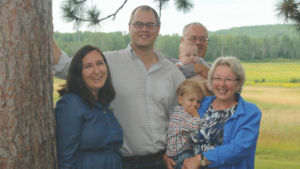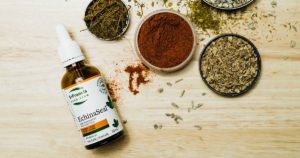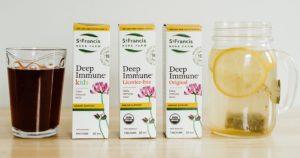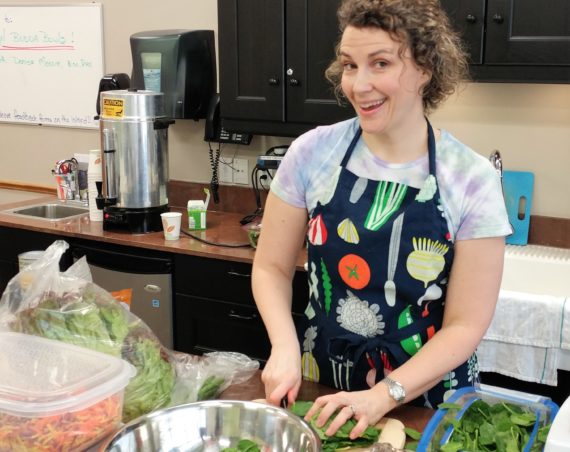Need to boost your immune system, calm your mind, or get better sleep? There’s an herb for that! Herbal supplements can be a great way to support our wellness. Whether it’s for prevention or healing, herbs are powerful plants to incorporate into our lives for a wide range of holistic health benefits. To help us learn more about using herbs to heal and support wellness, we connected with second-generation farmers and owners of St. Francis Herb Farm, Paul and Caitlin Rivett-Carnac. Their farm is certified organic and the herbs they grow are used in St. Francis Herb Farm herbal medicines. Some of the crops that they grow include valerian, burdock, nettle, sheep sorrel, and marshmallow, all of which naturally thrive in the Canadian climate.
We had the opportunity to chat with Paul and Caitlin about their herb farm and how herbal tinctures differ from powders. We got their tips on how to introduce tinctures to children and their thoughts on the buzzworthy adaptogen ashwagandha.
WEHL: What does wellness mean to St. Francis Herb Farm?
SF: Wellness is a way of life. Eating well, moving your body, slowing down and being aware of your spiritual side and using plant medicine for prevention and treatment.

WEHL: Tell us what St. Francis Herb Farm is and how the business got started.
SF: St. Francis Herb Farm started just over 30 years ago by Jeremy and Monique Rivett-Carnac. They were herbalists – growing herbs on a biodynamic farm and making herbal preparations. They started selling their products to local Naturopathic Doctors and then, as the business grew, they sold to health food stores.
WEHL: We understand there is actually a real St. Francis Herb Farm located in the Madawaska Highlands in Ontario. Tell us about it and what it’s like to run an organic farm.
SF: We have a beautiful and picturesque 50 acre certified organic farm, with a lake at the end and a creek running through the farm. We are growing a number of various herbs, including valerian, marshmallow, sheep sorrel and nettle. There is a greenhouse and open fields with raised beds for growing herbs. Having an organic farm is more than just not using pesticides and sourcing certified organic seeds, it is about investing in soil health through cover cropping and rotating crops.

WEHL: What is the Canadian climate like for growing herbs? Do you grow all of your herbs on the farm?
SF: We partner with organic farmers in Quebec and Ontario to grow various herbs. There are many other herbs, especially Ayurvedic and Chinese, that we use but cannot be grown in the Canadian climate. We have a number of long-time partners in other parts of the world where we source our certified organic herbs from.
WEHL: We’ve heard that you have opened an R&D facility. Why did you want to do this and what are your goals with the facility?
SF: We are very excited about this recent venture and it’s looking quite amazing with all the equipment, bottles, and ingredients! We are always working on new formulations and herbal preparations to create the best herbal products that we can and to develop new products. We have also partnered with the University of Ottawa to test various processes and ingredients to ensure that we are making the best herbal extracts possible. It is great to have a space that can focus on doing this.
WEHL: What are tinctures and how do you make them?
SF: Tinctures are liquid herbal extracts. The ground herb is mixed with organic alcohol and water. The ratio of alcohol and water varies, depending on the herb. We also use herbs that are freshly harvested, right from the field. Our dried herbs are recently harvested.

WEHL: How does taking herbs in a tincture differ from other forms such as powders, pills or teas?
SF: Taking tinctures is the best way to benefit from the herb’s therapeutic effects. What makes these tinctures very bioavailable is that the alcohol carries the herb’s active constituents into the bloodstream quickly. Hydro-alcoholic tinctures are a great means of thoroughly extracting herbs and removes the need for the body to extract the herbs through digestion when just the powdered herb is consumed.
WEHL: Tinctures can have an unfavourable taste, especially for children. Do you have any products or tips that can help us introduce tinctures to children?
SF: Great question. You are right, tinctures do taste herbally! You can experience a variety of flavours: bitter, tart, or mild. Our children’s formulas are more mild in flavour, due to the presence of organic vegetable glycerin and tinctures can be added to juice or smoothies to help with the flavour.
WEHL: What are some of your favourite herbal immune boosters and why?
SF: Our flagship product is Deep Immune. This formula is full of adaptogenic herbs like astragalus, codonopsis, licorice and Siberian ginseng, that help modulate and balance your immune system all year round.
WEHL: Your Elderberry Cough Syrup product is made with Elderberry and Wild Cherry Bark, blended with honey and essential oils. How did you develop the formulation and why did you choose these herbs?
SF: Elderberry, the base of our cough syrup, is widely used for its immune boosting action, while wild cherry bark is traditionally used to soothe coughs. Also, there is a lot of research around honey as a cough suppressant. Studies have found honey to be more effective than pharmaceuticals! Of course, it goes a long way to make the syrup more enjoyable too!
WEHL: Do you ever change the formulation of some of your products? If so, how do you decide that it’s time to do that?
SF: We have rarely changed our formulations. Compliance with Health Canada or difficulty sourcing a herb has required a few changes over our many years.
WEHL: There is a lot of buzz around the adaptogen ashwagandha. Why is this being called a multi-purpose wonder herb?
SF: Adaptogens are fascinating. They help the body to adapt and balance to environmental or physical stressors. Ashwagandha is an ayurvedic herb that was discovered centuries ago. Studies have shown this great herb to have many positive benefits such as boosting brain function, lowering cortisol and anxiety and has even been found to help with fertility in men.
WEHL: Do you have any tips for what to look for when purchasing adaptogen supplements?
SF: We are big believers in low process, organic herbs, processed and consumed in traditional ways. You will see a lot of adaptogens that are on the market that are being added to drinks or powders that are standardized extracts – which sometimes means a lot of processing and chemicals added to extract the one active constituent out of the herb. Go back to the basics! Get ashwagandha, astragalus or reishi tincture 🙂
WEHL: Do you have any advice for an entrepreneur who’s interested in building a socially and environmentally conscious business?
SF: Aside from the usual talk on focusing on one’s passion (which really is important), a couple things come to mind. One is to ensure that there are no questions to the quality of your product and to ensure that the quality story is clearly told. Consumers are so savvy now and they can smell inauthenticity. Also, there are so many stories of brands and business that exploded overnight or in a short period of time. Not all brands evolve that way. Many times, a business is a labour of love that requires hard work and growth over time. We have enjoyed steady, sustainable growth for just over 30 years.
Connect with St. Francis Herb Farm:
- Web: www.stfrancisherbfarm.com
- Email: [email protected]
- Wehl Platform: @stfrancis
We invite you to join our all-in-one healthy lifestyle app at Wehl.com!



